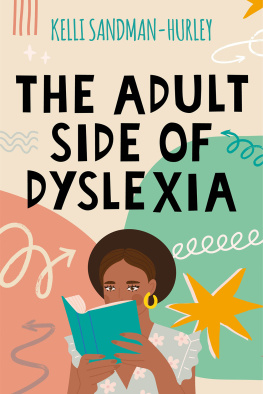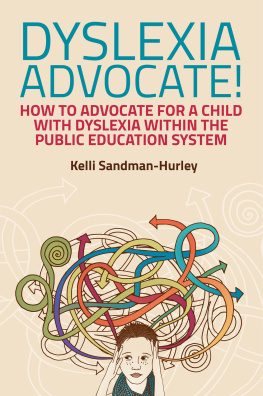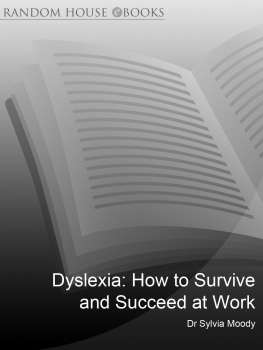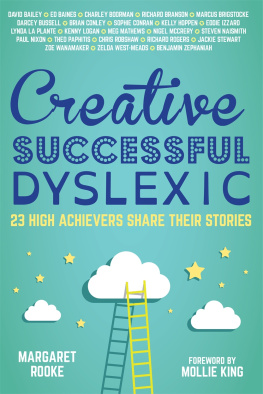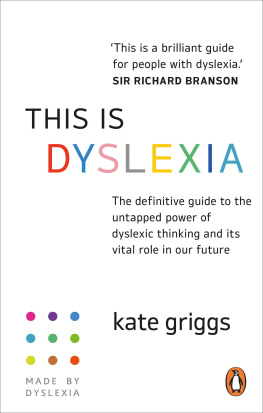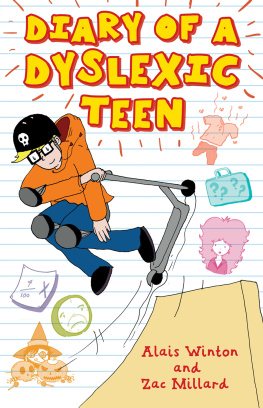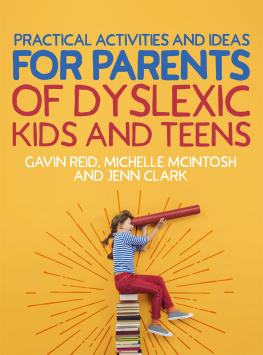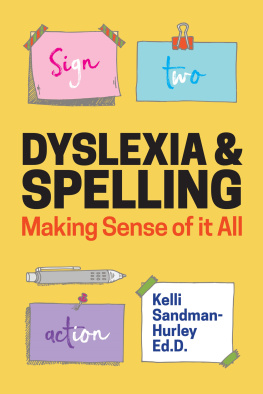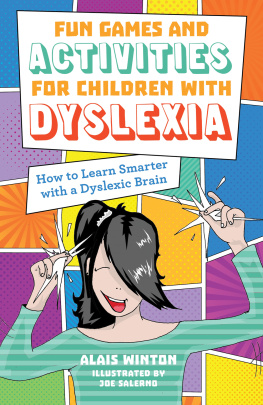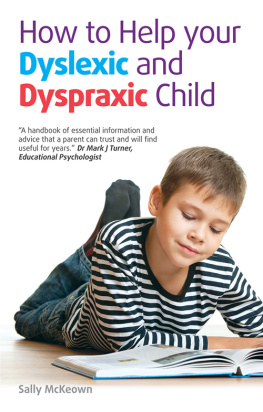Contents
Page list

By the same author
Dyslexia and Spelling
Making Sense of It All
Kelli Sandman-Hurley
ISBN 978 1 98592 791 1
eISBN 978 1 78450 760 2
Dyslexia Advocate!
How to Advocate for a Child with Dyslexia
within the Public Education System
Kelli Sandman-Hurley
ISBN 978 1 84905 737 0
eISBN 978 1 78450 274 4
of related interest
Self-Fulfilment with Dyslexia
A Blueprint for Success
Margaret D. Malpas MBE
ISBN 978 1 78592 198 8
eISBN 978 1 78450 472 4
The Bigger Picture Book of Amazing
Dyslexics and the Jobs They Do
Kate Power and Kathy Iwanczak Forsyth
Foreword by Paul Smith
ISBN 978 1 78592 584 9
eISBN 978 1 78592 585 6
The Adult
Side of
Dyslexia
Kelli Sandman-Hurley

First published in Great Britain in 2022 by Jessica Kingsley Publishers
An Hachette Company
Copyright Kelli Sandman-Hurley 2022
All rights reserved. No part of this publication may be reproduced, stored in a retrieval system, or transmitted, in any form or by any means without the prior written permission of the publisher, nor be otherwise circulated in any form of binding or cover other than that in which it is published and without a similar condition being imposed on the subsequent purchaser.
The fonts, layout and overall design of this book have been prepared according to dyslexia friendly principles. At JKP we aim to make our books content accessible to as many readers as possible.
A CIP catalogue record for this title is available from the British Library and the Library of Congress
ISBN 978 1 78775 475 1
eISBN 978 1 78775 476 8
Trigger Warning: This book mentions suicide
Jessica Kingsley Publishers policy is to use papers that are natural, renewable and recyclable products and made from wood grown in sustainable forests. The logging and manufacturing processes are expected to conform to the environmental regulations of the country of origin.
Jessica Kingsley Publishers
Carmelite House
50 Victoria Embankment
London EC4Y 0DZ
www.jkp.com
This is dedicated to every single person who has ever struggled in school. To everyone who hid under a desk to avoid reading. To everyone who ran out of the classroom to avoid reading out loud. To everyone who still hopes no one will find out about their dyslexia. To all the adults who trusted me to do the right thing with their stories. I know it was hard and sometimes painful. Your tears and trembling voices did not go unnoticedI hope I took good care of them.
Acknowledgements
A special thank you to my dad for reading everything I write and being critical, in a good way. To my mom for being supportive and always proud of me. To Talia and Olivia for doing the tedious work for me. To Stephen and Stacey for being my sounding boards.
To Rick and Casey for absolutely everything.
Contents
Preface
Plain and simple, dyslexia is a major pain in the butt. I dont know how else to describe it. Natalee
To advocate means to add your voice. That is what the adults with dyslexia did when they sat down to be interviewed for this book. They added their voice to the discussion about dyslexia. They filled a void in the dyslexia discussion. They did so to try to make the dyslexic experience better for someone else.
For me, this book was a passion project. It was written in response to my experience as an adult literacy professional and all of the adults I met during that journey. As I left the adult literacy world and ventured into the world of children with dyslexia, and their families, the adults I met continued to be the driving force that kept me going and a constant reminder that children with dyslexia become adults with dyslexia. I often notice that those with dyslexia are not sought out for their opinions on topics like reading, writing, spelling instruction, and teaching practices. I also noticed that the social/emotional health of students struggling with reading and spelling is absent from instructional approaches. Their voices may not be muted, but they are definitely muffled.
This book was written for anyone with dyslexia who wants/needs to know that they are not alone and that there are many, many adults who shared their story. It was written for parents who are trying to understand how their children are feeling. And it was written for educators, policy makers, advocates, school administrators, corporate trainers, bosses, judges, justice system employees, and anyone else who needs to understand how to accommodate for, and empathize with, the adults with dyslexia in their lives.
These stories remind us all that the words we use matter, the programs we use matter, the decisions we make about instruction matters, and yes, spelling matters. More often than not, we are making decisions about people with dyslexia without asking for their input. We dont ask for their guidance. We forget that they may have experienced school-induced trauma, and we have to understand how that has affected them in adulthood.
The chapters
How Would You Describe Your Dyslexia? In this chapter, the adults share how they talk about their dyslexia, revealing that they describe it as an experience, not a clinical diagnosis. Their descriptions are compared with how the education system defines dyslexia, and points are made about the discrepancy between the two descriptions and the advantages of creating a definition that encompasses both the clinical definition and the experience.
Dyslexia Hurts Dyslexia affects so much more than reading and spelling. In fact, struggles with reading and spelling affect behavior and that behavior often masks the pain the student is trying to hide. This chapter shares how dyslexia manifests in physical and behavioral symptoms and how those symptoms are often misunderstood.
Dyslexia-Induced Distrust Many adults with dyslexia have children themselves and when they notice reading and spelling difficulties in their own children, they often have anxiety and fear about having to return to a school to help their children get the services they need. They also have distrust of any education system that prevents them pursuing education and job advancement as adults. This chapter highlights how that distrust from childhood has prevented so many adults from attaining their goals.
Traumatic Teaching Practices Some everyday teaching practices may seem harmless but to the student with dyslexia, they can be traumatizing. In this chapter the adults describe the long-lasting effects of having to read out loud in front of their peers, which is often described as traumatic.
Is Spelling Important to You? Just about every adult with dyslexia will report that they still struggle with spelling, yet often they are not taught spelling because it is deemed unimportant or an issue that can be remedied by technology. This chapter provides evidence that spelling does matter, and the adults share stories about how poor spelling has affected them.
Do You Think Dyslexia is a Gift? This chapter examines the popular narrative that dyslexia is a gift and that people with dyslexia have inherent talents that will lead them to success. The adults share their opinions about that narrative, based on their own experiences.
Has Dyslexia Affected Your Ability to Succeed? In an effort to shine a more positive light on the experience of those with dyslexia, the dyslexia community shares a lot of positive stories about adults who have been very successful. In this chapter, the adults share how dyslexia has either prevented them from achieving success or has, indeed, helped them become successful. However, they attribute their success to hard work, advocacy, and determination, describing their success as being despite dyslexia, not because of it.

